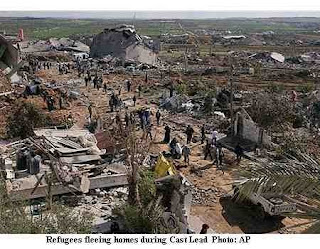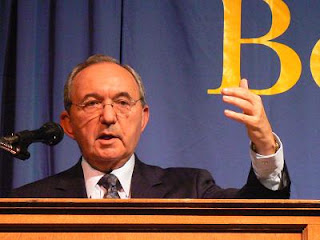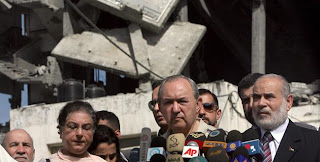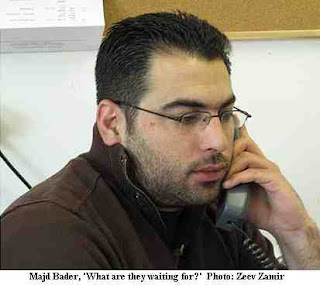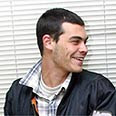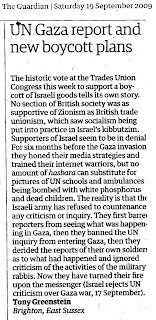The reaction of Israel’s military spokespersons and government to the Goldstone Report, a report from a liberal Zionist and ex-South African judge speaks volumes. They are determined not to deal with the substance of the Report but to attack its author.
I had a letter published in the Guardian yesterday pointing this and one or two other inconvenient facts out and it is republished below uncut.
Like any criminal at the bar of justice, Israel’s main complaint is that the Report is ‘biased’ and not good for the ‘peace process’. A process which seems to not only absolve Israeli war crimes but give it advance immunity to commit more.
Below are 2 reports from Ynet (the English on-line version of the Israeli daily, Yediot Aharanot).
Tony Greenstein
Goldstone testimonies revealed
Eight months after Operation Cast Lead in Gaza, controversial UN report accuses Israel of committing war crimes, enraging many officials in Jerusalem. Now, Ynet reveals number of Palestinian testimonies detailed in report
Jonathan Weber Published: 09.16.09, 15:48 / Israel News
An in-depth look into the Goldstone Report probing the events of Operation Cast Lead in Gaza reveals the official first-hand testimonies from the days of the war. The testimonies were given by family members who lost their loved ones and eyewitnesses to the fighting, and they shed some personal light on what happened in Gaza.
All testimonies where deemed credible by the United Nations-appointed inquiry team, and were compatible with other reports received. Here are just some of the testimonies:
The shooting of Iyad al-Samoni
On the night of January 4, 2008, Iyad al-Samoni stayed with his wife, five children and 40 other members of his extended family in one a relative’s house. Around 1am, sounds were heard coming from the roof, and some four hours later, Israeli soldiers came down the steps, knocked on the door and entered the house.
The soldiers asked if there were Hamas operatives in the house. The family members said there weren’t. Then the soldiers separated the men, from the women, children and elderly. The men were handcuffed, blindfolded and sent to a separate room, and were only allowed to leave to the toilet after one of them could no longer hold his bladder and urinated in the room. The soldiers settled in the house.
The next morning, the family members left the house and started marching westward on Salah a-Din Street which leads to Gaza City. The soldiers ordered them to walk straight ahead on not stray from their path. The men were still handcuffed and the soldiers threatened gunshots if they tried to remove the shackles. While marching on Salah a-Din Street the, a single soldier or a number of soldiers station on the street’s rooftops opened fire at the family. Iyad was hit in his legs and fell to the ground.
His relative, Muhammad Assad al-Samoni tried to assist him, but one of the soldiers ordered him to continue marching. After noticing that the laser beam from the soldier’s weapon was aimed at him, Muhammad decided not to insist. The soldier also fired warning shots at Muhammad’s father, who tried to approach Iyad, and did not heed the family’s calls to evacuate the injured Iyad.
And so, the family was forced to abandon Iyad and keep marching towards Gaza City. Only three days later did rescue services get permission from the IDF to evacuate the body of al-Samoni, who was left handcuffed in the street and bled to death.
Juha family’s journey
The Juha family’s home is located a few meters away from the al-Samoni family’s home. The family’s house was hit by a number of missiles on the nigh of January 4 and was seriously damaged. In the early morning hours soldiers entered the house and fired gunshots into the room where Muhammad was staying with his two wives, his mother and his 13 children. The family was taken to the upper part of the house and was then ordered by soldiers to march towards Rafah.
The Juha family took off with the Sawafiri family, which lives next door. When the two families passed by the home of the Abu-Zoor family, they latter took them in. The three families spent the rest of the day together. The next morning, the house was attacked by the IDF. Soldiers ordered the three families to leave and separated the men from the women and children. Four men were taken to a nearby house and the rest were ordered to continue marching towards Rafah.
At one point, while they were walking on al-Sakka Street, the families reached a large gap that blocked their path. The ruins around the gap prevented any passage and, and was a particularly difficult obstacle for the elderly. The family was therefore forces to turn eastwards to Salah al-Din Street, and stopped to rest at the Moughrabi family’s home. After their experience at the Abu-Zur house, Juha decided it would be best to continue walking elsewhere. The Moughrabi family advised him to stay in their home, but the three families took off once again, with 15-year-old Ibrahim Sawafiri carrying a white flag.
The moved along a short distance and then two gunshots were heard that hit Ibrahim in the chest. The three families ran back to the Moughrabi home, where they tried to give the youth medical treatment. Ibrahim’s mother tried to stitch his wounds with a needle and threat that she tried to sterilize with cologne. Some six hours later, Ibrahim Sawafiri died of his wounds. The three families remained at the Moughrabi home for three more days before aid organizations moved them to Gaza City.
Death of Majeda and Ra’aia Hajjaj
Johr a-Deek is a village located some 1.5 kilometers from the Israel border, southeast of Gaza City. On January 3, tanks entered the village, with some of them headed towards Salah a-Din Street and the Zeitun neighborhood, and some of the occupied the village. The next day, around 6am, shells hit the Hajjaj family’s home – in which father Yousef, his wife and children, his brother’s wife and her children, their sister Majeda, and the matriarch Ra’aia were staying. Yousef’s daughter, 13-year-old Manar was injured in the strike.
The Hajjaj family decided to move next door to Muhammad al-Safadi’s home. Around 11am, Yousef phoned his brother and told him there were reports on the radio that the IDF was asking all residents who live along the border to evacuate their homes for their own safety.
The Hajjaj and al-Safadi families left the house, which two of them carrying white flags. They marched westward and when they reached a distance of some 100 meters from Israeli tanks, which opened fire at them. Majeda and Ra’aia were injured. Majeda died shortly after, and Ra’aia tried to escape but collapsed a few meters later and died. The families fled back to the Hajjaj family home, and took an alternative road to Gaza City the next day. The family found the bodies of Majeda and Ra’aia under heaps of ash only when they returned to their house on January 18.
Putting out phosphorus fires
On the night of January 12, the IDF struck houses in Huza’ah, a small Gaza village east of Khan Younis. Several white phosphorus shells hit the al-Najar family home in the village. The home, like many others in the area, caught fire. The residents spent the majority of the night trying to put out the flames.
The night also saw IDF troops take to several rooftops, where they could observe the firefighting. Around 3am, tanks and bulldozers began making their way to Huza’ah.
At dawn, the IDF asked the men to leave their homes and march towards the tanks. Once they obeyed they were separated into two groups and placed under guard, in two houses.
Around 7am, Ruhiya, a local resident who during the night placed makeshift white flags on the rooftop of her home, decided – along with several other women – to march to the village square. The women were carrying white flags and reportedly shouted at the soldiers that they had children with them.
They walked to the home of Fariz al-Najar, who was taken by the soldiers. The soldiers apparently created a hole in the wall in order to allow surveillance of the nearby alley.
When the women were about 200 yards from the house, a shot was fired, hitting Ruhiya. Her neighbor, Yasmin al-Najar, was also shot, in the leg. A gun fight ensued, forcing the women and children to find shelter in nearby houses, leaving them helpless to assist thier injured friend.
The Khan Younis hospital was alerted to the situation in Huza’ah around 7:45am. An ambulance arrived at the alley within an hour and attempted to reach Ruhiya, but reportedly came under IDF fire and was forced to back away.
Her body was eventually recovered the following evening. It is unclear whether she could have been saved had she been given medical attention.
Israelis who spoke at Goldstone committee: State must wake up
Contrary to outraged official Israeli response to Goldstone Report, which accused IDF of war crimes during Operation Cast Lead, Israelis who testified before UN-appointed committee say investigation was balanced, fair, hope Israel learns from report’s conclusions
Daniel Edelson, 09.16.09, 09:08
The State of Israel officially condemned on Tuesday the Goldstone Report which accuses the IDF of committing war crimes during Operation Cast Lead in Gaza, but the Israelis that testified before the special UN-appointed inquiry commission actually welcomed the harsh report, and urged the government not to ignore its conclusions.
“Israel should wake up and take it upon itself to investigate the claims,” said Attorney Majd Bader, who testified before the committee on behalf of the Public Committee Against Torture in Israel.
“The State should study the Goldstone Report very well, consider it seriously, and understand the evidentiary groundwork that it laid and adopt its conclusions,”
According to Bader, human rights organizations had asked the government to set up an independent inquiring body shortly after the operation came to its end, but were ignored.
“The Attorney General and those entrusted with enforcing the law in the State didn’t even think of it. They just rejected the demand immediately. This resulted in other bodies taking care of the issue and now the conclusions are in.
“In our opinion, it is better late than never. The State of Israel and the enforcement authorities should wake up and take upon themselves the moral and legal obligation to probe the claims. What are they waiting for?”
Bader believes Israel’s response was inappropriate. “Regarding (Israel’s) grievances over the comparison to Hamas – in the same measure, any Palestinian will say ‘What about the comparison between the occupier and the people it is occupying?’ How can it be that the victim and the aggressor are judged according to the same standards?
“The question is why are they calling the report insolent? Surely none of those who have responded have had the chance to read its 547 pages, so what is this based on? They are firing an automatic response that was prepared in advance. The recommendations should be studied. The committee, at least in its treatment of my testimony, examined in depth and heard my words in a very balanced way which was respectful to both parties.
“I heard of how at the end of Noam Shalit’s testimony, for example, the committee members told him they sympathized with him and understand his pain. To come and rule out in one stroke everything that the committee has done is not serious.”
‘Treat Israel like a criminal state’
Left-wing activist Yonatan Pollak, who also testified before the committee, said the harsh report united the various human rights organizations in Israel.
“It’s wrong to say that everyone is rejecting the conclusions of the report, the government can say what it wants, but all the human rights organizations are calling on Israel to launch an investigation into the incidents of the attack on Gaza and not refute the report’s conclusions.
“Such cooperation between human rights organizations has not been seen in a long time.”
Pollak believes that, as in past cases, this time as well, the government will not bother to reach conclusions from the findings and open an official investigation, and therefore, the international community must respond sternly.
“Israel’s official response, as in its responses to prior reports, proves that there is no chance that Israel will probe the matter on its own,” he said.
He said the only solution to Israel’s “indifference” is an external inquiring body with the proper jurisdiction for imposing penal sanctions.
“The investigation must be carried out via international bodies that have the authority to probe and act against Israel. “It’s time that the Israel and international societies start to treat Israel like a criminal state and a serial violator of international laws and Palestinian rights and impose on it a boycott, sanctions and the withdrawal of investments, just as was the case with the apartheid regime in South Africa,”
Pollak agreed with Bader’s impression that the committee’s work was thorough and balanced, and that Israel’s claims of bias are unfounded.
“It was my impression that this was a serious committee. I saw all the Israelis’ testimonies and they were treated appropriately. On the other hand, the committee members heard the testimonies after visiting Gaza and seeing the catastrophe with their own eyes. The Israeli suffering cannot, and should not be expected to receive the same treatment as that of the Palestinians, because it simply doesn’t come close,”
Letter Guardian 19.9.09. (uncut)
The reaction of Mark Regev, spokesman for Israeli Prime Minister Benjamin Netanyahu, to the United Nation’s Goldstone Inquiry (Israel rejects UN criticism over Gaza war, Guardian 17 September) speaks volumes. Using biblical metaphor, the report was apparently ‘conceived in sin and is the product of a union between propaganda and bias.’
The clear message from Israel’s very own propaganda chief is that despite being authored by a liberal Zionist and former South African judge, Richard Goldstone, the Inquiry’s findings are motivated by anti-Semitism. There was a time when such accusations might have had some political purchase but those days have long since gone.
The historic vote at the Trade Union Congress this week to support a boycott of Israeli goods tells its own story. No section of British society was as supportive of Zionism as that of British trade unionism which saw socialism being put into practice in Israel’s kibbutzim.
Mark Regev speaks about bias and he is correct. Just as those who condemned the pogroms against Europe’s Jews were biased against anti-Semitism, so those who were opposed to the one-sided war against the Palestinians of Gaza were biased. Bias in favour of justice is surely no offence?
Supporters of Israel seem to be in denial. For 6 months before the Gazan invasion they honed their media strategies and trained their internet warriors but no amount of hasbara can substitute for pictures of UN schools and ambulances being bombed with white phosphorous and dead children. A war crime is not diminished by a silver tongue.
The reality is that the Israeli army has refused to countenance any criticism or inquiry. They first barred reporters from seeing what was happening in Gaza, then they banned the UN Inquiry from entering Gaza, then they derided the reports of their own soldiers as to what had happened and ignored criticism of the activities of the military rabbis. Now they have turned their fire upon the messenger.
Those who learn nothing from the past are condemned to repeat its mistakes.
Yours sincerely,
Tony Greenstein
